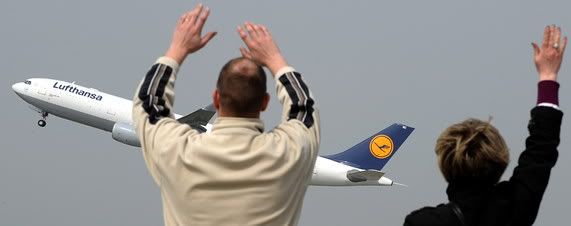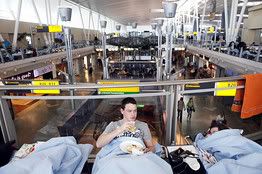
Relatives of flight passengers waved to a Lufthansa airplane with the destination of Chicago taking off from the airport in Duesseldorf, western Germany, on Tuesday.

Briton Huw Thomas ate breakfast on a cot at John F. Kennedy International Airport in New York Monday.
Some European airports reopened Tuesday and others were set to open progressively throughout the day after air-traffic controllers gave the go-ahead for the resumption of some commercial flights, but with conditions remaining variable in parts of Europe, airlines were unable to make plans with certainty.
Airports in Scotland and northern England were open again. A spokesman for airport operator BAA Ltd. said its airports in Glasgow, Edinburgh and Aberdeen had reopened, but that its other airports—London's Heathrow and Stansted, and Southampton—remained shut. Germany and France were expected to reopen airspace later in the day.
The openings came a day after European air-safety authorities agreed to relax flight bans that it enacted after Iceland's Eyjafjallajökull volcano started erupting violently late Wednesday, spewing a cloud of fine but potentially dangerous dust high into the atmosphere. Days of airspace closures across most of northern and central Europe, the world's biggest restriction of flights since 2001, have left more than eight million passengers dislocated and cost airlines at least $1 billion dollars.
Following criticism by airlines that authorities were being overly cautious in grounding flights, European Union officials agreed Monday to divide EU airspace into three zones based on ash concentrations in the atmosphere. European aviation authorities will establish a "limited" no-fly zone surrounded by a buffer area, and airlines will be allowed to fly outside the zone once they are opened by national authorities.
Carriers were quick to make plans to get aircraft off the ground. Eurocontrol, an umbrella agency that coordinates air traffic across 38 European countries, said it expected 14,000 flights to take place Tuesday, roughly half of regularly scheduled air traffic of between 27,000 and 28,000 flights.
Germany's Deutsche Lufthansa AG will operate about 200 flights, including most of its scheduled long-haul flights, a spokeswoman said. Selected domestic and European flights will also run, she added.
French Ecology Minister Jean-Louis Borloo told RTL radio that around three-quarters of scheduled international flights will depart from Paris's two main airports, Roissy and Orly. Air France-KLM SA said its long-haul flights from the two airports would return to normal. KLM, the carrier's Dutch arm, said it has resumed most of its intercontinental flights and more than half of its European operations Tuesday. The airline added that it was using its extensive SkyTeam alliance network to bring home stranded passengers as soon as possible.
But unlike its German and Franco-Dutch peers, U.K. flag carrier British Airways PLC was still waiting to find out whether it will be able to resume some long-haul flights from London airports later Tuesday. However, some London-bound flights from Asia, the west coast of the U.S., Mexico and Mauritius had departed and were expected to arrive in the U.K. after 7 p.m. local time (2 p.m. ET), a BA spokeswoman said, adding that the airline has contingency plans if London airports remain closed. The airline said Monday that it had hoped to fly some short-haul routes Tuesday, but changing conditions forced it to abandon those plans.
Britain's National Air Traffic Services agency said Tuesday that airspace over Scotland and in northern England as far south as Newcastle Airport would remain available from 1 p.m. to 7 p.m., but restrictions would remain in place over the rest of the U.K. below an altitude of 20,000 feet. Flights above that height will be permitted between 1 p.m. and 7 p.m., allowing aircraft to fly over the U.K.
"The situation regarding the volcanic eruption in Iceland remains dynamic and the latest information from the Met Office shows that the situation today will continue to be variable," NATS said.
Flight disruptions are likely to continue during the week, even though more planes were flying Tuesday, said Helen Kearns, spokeswoman for Transport Commissioner Siim Kallas. "We are faced with an unprecedented crisis, the disruptions will continue over the week," she said.
A fresh cloud of volcanic ash from Iceland's Eyjafjallajokull volcano is expected pass over the U.K. and Denmark, but spare France, the European Volcanic Ash Advisory Centre said Tuesday. The new cloud of ash is forecast to arrive Tuesday, and the U.K., in particular, is expecting further disruption.
"Given the meteorological conditions, the volcanic ash should pass over the southern part of the North Sea, the British Isles, Denmark, Scandinavia and perhaps the extreme north of France," said forecaster Didier Rosenblatt.
The reopening of European airspace couldn't come soon enough for passengers and airlines, which are losing hundreds of millions of dollars each day they are grounded. Irish airline Aer Lingus Group PLC on Tuesday estimated its total cash costs from the five-day closure of airspace at between €15 million and €20 million ($20.2 million and $27 million). The company put the daily cost at between €4 million and €5 million, as a result of lost revenue and the costs of passenger disruption. BAA, the U.K. airport operator owned by Spain's Grupo Ferrovial SA, said it is losing between £5 million £6 million a day.
Manufacturing also is feeling the squeeze from blocked global trade routes. Japan's Nissan Motor Co. said Tuesday it will temporarily suspend part of its domestic production lines as it is unable to import air pressure sensors from Ireland.






0 comments:
Post a Comment